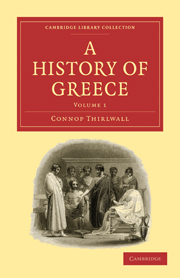Book contents
- Frontmatter
- ADVERTISEMENT
- Contents
- CHAPTER I GEOGRAPHICAL OUTLINES OF GREECE
- CHAP. II THE EARLIEST INHABITANTS OF GREECE
- CHAP. III FOREIGN SETTLERS IN GREECE
- CHAP. IV THE HELLENIC NATION
- CHAP. V THE HEROES AND THEIR AGE
- CHAP. VI THE GOVERNMENT, MANNERS, RELIGION, KNOWLEDGE, AND ARTS OF THE GREEKS IN THE HEROIC AGE
- CHAP. VII THE RETURN OF THE HERACLEIDS
- CHAP. VIII THE LEGISLATION OF LYCURGUS
- CHAP. IX THE MESSENIAN WARS AND AFFAIRS OF SPARTA DOWN TO THE SIXTH CENTURY B. C.
- CHAP. X NATIONAL INSTITUTIONS AND FORMS OF GOVERNMENT
- APPENDIX
CHAP. VIII - THE LEGISLATION OF LYCURGUS
Published online by Cambridge University Press: 05 July 2011
- Frontmatter
- ADVERTISEMENT
- Contents
- CHAPTER I GEOGRAPHICAL OUTLINES OF GREECE
- CHAP. II THE EARLIEST INHABITANTS OF GREECE
- CHAP. III FOREIGN SETTLERS IN GREECE
- CHAP. IV THE HELLENIC NATION
- CHAP. V THE HEROES AND THEIR AGE
- CHAP. VI THE GOVERNMENT, MANNERS, RELIGION, KNOWLEDGE, AND ARTS OF THE GREEKS IN THE HEROIC AGE
- CHAP. VII THE RETURN OF THE HERACLEIDS
- CHAP. VIII THE LEGISLATION OF LYCURGUS
- CHAP. IX THE MESSENIAN WARS AND AFFAIRS OF SPARTA DOWN TO THE SIXTH CENTURY B. C.
- CHAP. X NATIONAL INSTITUTIONS AND FORMS OF GOVERNMENT
- APPENDIX
Summary
We now return to the Dorians of Peloponnesus, whose history, scanty as is the information transmitted to us concerning its earlier ages, is still somewhat less obscure, and much more interesting, than that of the other Greek tribes during the same period. Our attention will for some time be fixed on the steps by which Sparta rose to a supremacy above the rest of the Dorian states, which was finally extended over the whole of Greece. This is the most momentous event of the period intervening between the Return of the Heracleids and the Persian wars. It was in part an effect of the great addition which Sparta made to her territory, by swallowing up that of her western neighbour. But this conquest may itself be regarded as a result of those peculiar institutions, which, once firmly established, decided her character and destiny to the end of her political existence, and which are in themselves one of the most interesting subjects that engage the attention of the statesman and the philosopher in the history of Greece.
Before we attempt to describe the Spartan constitution, it will be necessary to notice the different opinions that have been entertained as to its origin and its author. It has been usual, both with ancient and modern writers, to consider it as the work of a single man — as the fruit of the happy genius, or of the commanding character, of Lycurgus, who has generally been supposed to have had the merit, if not of inventing it, yet of introducing and establishing it among his countrymen.
- Type
- Chapter
- Information
- A History of Greece , pp. 291 - 340Publisher: Cambridge University PressPrint publication year: 2010First published in: 1835

